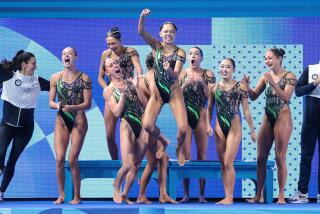SWIMMING / WORLD CHAMPIONSHIPS : China Makes Big Splash With 100 Freestyle Record, Controversy
- Share via
ROME — Not even one minute into the first night of swimming’s World Championships, the tidal wave from China that had been forecast began to sweep across the pool at Foro Italico with the same shocking force as the lightning that struck two nights earlier and forced postponement of a diving event.
In the first final Monday, the women’s 100-meter freestyle, both Chinese women broke the world record set by the United States’ Jenny Thompson, and the winner, Le Jingyi, broke it by almost half a second with a time of 54.01 seconds.
Compare that to the 12 years it took the women to lower the 100 freestyle record by half a second before Thompson swam her 54.48 in 1992 and it is easy to understand why the world of swimming felt it had just witnessed lightning striking twice.
“Wow,” said Thompson after seeing Le’s time on the scoreboard. “That’s ungodly.”
Perhaps unholy would be the word preferred by many within the sport who suspect the Chinese women are fueling their performances with substances more illicit than the caterpillar fungus, turtle blood soup and ground deer horns that they claim as part of their diets.
Their accusers were more skeptical than ever Monday, when the Chinese women went three for three in finals. Although their winning times in the 400-meter individual medley and the 800-meter relay were not as impressive as Le’s in the 100 freestyle, they were world championship records.
“That’s absolutely ridiculous,” said former U.S. swimmer Summer Sanders, who won gold, silver and bronze medals in the 1992 Summer Olympics. “If it keeps going this way all week, there’s going to have to be a serious investigation.”
Richard Quick, the U.S. women’s coach from Stanford, has made similar demands as the Chinese women have emerged as world powers in less than six years, claiming that they were involved in “pharmaceutical warfare.” But it was apparent Monday that he does not want to battle them anywhere this week except in the pool.
“I want everything done, all year, 365 days a year, to have this be a fair contest,” he said. “But this is not the time and place to address it. When you’re at a championship, the mode of operation has to be that you worry about the things you can control, and you don’t worry about the things you can’t control.”
His swimmers, for the most part, followed his lead. Thompson, who also has cast aspersions upon the Chinese in the past, cooled off in the practice pool for a long time before emerging to say that she is not intimidated by them. She might have beaten Le, she said, if she had not been set back this summer by a broken arm suffered in a water slide accident.
Instead, she finished fourth in 55.16. That was almost four-tenths of a second out of the medals as Germany’s Franziska van Almsick finished third in 54.77 and China’s Lu Bin second in 54.15.
“All I know is I’m going to work my. . . .off to try to win the gold medal in my home country (during the 1996 Summer Olympics in Atlanta) and try to get the world record,” Thompson said.
“Actually, it’s not undoable. My lifetime goal is to go under 54 seconds. I still think that’s within my reach, maybe in a year when I don’t have a broken arm.”
As for the winner, Le, 19, of Shanghai, barely had a moment to enjoy her triumph before she was asked about drugs.
Calling the allegations groundless, she said: “When the Europeans and Americans get very good results at major competitions, no one accuses them of using drugs. When the Chinese come to the forefront in sports, we are accused. It’s unfair. I think some people are jealous.”
Asked how many drug tests she has taken this year, she said, “I can’t remember because there have been so many.”
She had to take another Monday. The international swimming federation, FINA, was criticized during the 1992 Summer Olympics for its policy of testing finalists at random, which meant that medalists might not be called upon. In response, officials announced here last week that all champions, as well as other finalists chosen at random, would be required to submit to tests.
Joining Le in doping control was Dai Guohong, 17, who won the 400 individual medley in the world’s fastest time this year, 4:39.14. The woman with the year’s previous best time, the United States’ Allison Wagner, was second in 4:39.98 after losing more than two seconds in the breaststroke. Kristine Quance of Northridge was third in 4:42.21.
The Chinese also won the 800-meter relay in 7:57.96, easily beating the van Almsick-led Germans, second in 8:01.37, and the U.S. team of Cristina Teuscher, Thompson, Janet Evans and Nicole Haislett, third in 8:03.16.
Now, the Chinese want to prove they have really arrived, setting their sights on van Almsick in today’s 200 freestyle, Evans in Wednesday’s 400 freestyle and Hungary’s Krisztina Egerszegi in both backstrokes.
Some experts predict the Chinese will win half of the 16 women’s events, which is one less than they won earlier this year in the world short-course championships. After the first day, they have only two fewer medals than they won in the 1991 World Championships at Perth, Australia.
It would be nice, the other swimmers confess, to hear a national anthem other than China’s during the medal ceremonies.
“I’m sick of that song,” Thompson said.
More to Read
Go beyond the scoreboard
Get the latest on L.A.'s teams in the daily Sports Report newsletter.
You may occasionally receive promotional content from the Los Angeles Times.






